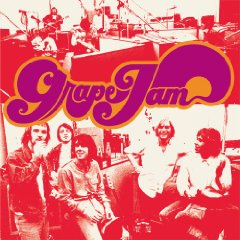
- Format: FLAC

Fisher MT-35 Turntable >> Optimus Amplifier >> Soundblaster Audigy 2 ZS >> Wavelab >> Flac 1.13
Jerry Miller - Guitars
Skip Spence - Guitars & Piano
Bob Mosley - Bass & Vocals
Don Stevenson - Drums
Al Kooper - Piano
Mike Bloomfield - Piano
Lindsay Planer(AMG)
Grape Jam (1968) is roughly a half-hour of free-form primarily instrumental interaction showing off Moby Grape's formidable chops. This offered a distinct contrast to the shorter and comparatively compact cuts on Moby Grape's second long-player, Wow (1968), with which the extra platter was packaged as a gratis "premium." Brought in to accompany Peter Lewis (guitar), Bob Mosley (bass), Jerry Miller (guitar), Skippy Spence (guitar), and Don Stevenson (drums) were special guests Michael Bloomfield (guitar/piano) and Al Kooper (keyboards), who were still a few months away from their own landmark Super Session (1968) with Stephen Stills (guitar). Mosley's languid opener, "Never," has the feel of a late-night confab and is highlighted by Stevenson's understated yet adeptly executed timekeeping. The dirge-like cadence also allows for some excellent fretwork from Miller. The song was borrowed by Led Zeppelin several years later, resurfacing as "Since I've Been Loving You" on Zep's III (1970). "Boysenberry Jam" is a funky and aggressive excursion with Miller's piercing guitar recalling similar inflections on "Murder in My Heart for the Judge" and "Can't Be So Bad" from Wow as well as "Hey Grandma," the leadoff track from the Grape's 1967 self-titled effort. Even more laid-back is "Black Current Jam," developing organically from a distinct R&B feel not very far removed from a Memphis-style groove. As Bloomfield plays piano only on "Marmalade," it is presumably Al Kooper who is tickling the ivories here. Whomever it is, he serves up a tasty and emphatic counterbalance to the rock-solid rhythm section. Indeed, Bloomfield's contributions to "Marmalade" are easily distinguishable and his licks are blues-infused, charging through one of the better ventures on the album. The concluding "Lake" is a bit of psychedelic madness credited to Michael Heyworth and is filled with reverse-looped audio tapes as part of the sonic pastiche.